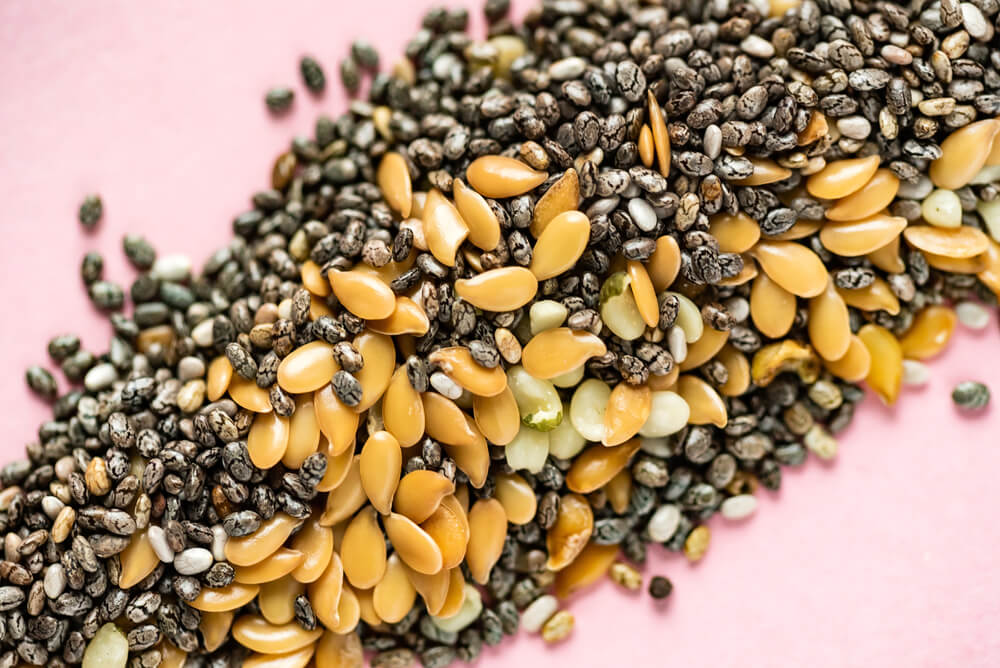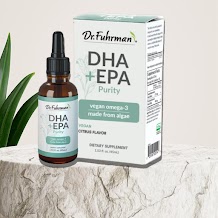Omega 3s are a type of polyunsaturated fat with numerous health benefits. They are considered “essential” fatty acids because your body can’t manufacture them on its own.
This means that you need to get your daily supply of omega 3s through your diet. This can be challenging— though not impossible— for plant-based eaters, since fish are the biggest source of the most potent forms of omega 3 (more on that later).
To help ensure you are getting enough of this valuable fat, here’s more on what it does for your body, why it’s so good for you, and the top plant sources of omega 3.
Key Types of Omega 3s to Know About
Omega 3 is not a single fat but rather a group of several essential fatty acids. As a whole, omega 3s have somewhat similar effects in your body, but each one does have distinct properties.
Here’s a quick look at the three most important types of omega 3:
- Eicosapentaenoic acid (EPA)— Important for fetal development and healthy aging. Considered one of the “active” forms of omega 3.
- Docosahexaenoic acid (DHA)— Key component of all cell membranes and found abundantly in the brain and retina. Also considered an “active” form of omega 3.
- Alpha-linolenic acid (ALA)— The omega 3 present most abundantly in plants. Your body can convert it to EPA and DHA, but the process is very inefficient. Conversion rates are estimated at only 3-10% of ALA being converted into EPA or DHA.
As you may have noticed, EPA and DHA are the types of omega 3 that can be actively used by your body. That’s not to say ALA doesn’t have any benefits (your body can use it for energy, for example), but EPA and DHA are usually considered the most critical to have out of the three.
This distinction will be important later on when we get to the best plant sources of omega 3, but for now, just know that you would have to consume a LOT of ALA in order for it to be converted to sufficient amounts of DHA/EPA.
Note: There are other forms of omega 3— like DPA and SDA— but focusing on the three listed above is the main key for better health.
Top Health Benefits of Omega 3 Fatty Acids
They Fight Inflammation

As you may know chronic (i.e., long-term) inflammation contributes to many chronic diseases, including cancer. Reducing it is one of the best protective measures you can take for your health— and something omega 3s can help with.
Studies have consistently found that omega 3s have powerful inflammation-fighting effects. They have been shown to reduce the production of certain molecules related to inflammation and can even protect against oxidative stress. (Oxidative stress damages cells and contributes to chronic inflammation.)
Notably, all major forms of omega 3 combat inflammation. This includes ALA, the main type found in plant sources of omega 3.
Very Supportive of Heart Health
There is perhaps no better example of how beneficial omega 3s are than what they can do for your heart.
To start with, omega 3 fatty acids— specifically DHA— have shown an ability to significantly reduce triglyceride levels and raise HDL (good) cholesterol levels. They may also help lower LDL (bad) cholesterol levels when they replace saturated fats in the diet.
All of this is good news for your heart, but it gets even better.
Some research shows that omega 3s can even keep blood platelets from clumping together. This means they may help prevent blood clots that could contribute to a heart attack or stroke.
In addition, omega 3s not only combat chronic inflammation in general, they also specifically lower markers of inflammation directly associated with heart health— like high sensitive C-reactive protein (hs-CRP).
Overall, these fatty acids can be considered an “essential” part of a heart-healthy diet!
Could Slow Age-Related Cognitive Decline

Declining brain function and memory loss have become something of an “epidemic” in modern times. Diagnoses of dementia and Alzheimer’s are on the rise, affecting a larger portion of the population.
There’s no magic bullet for keeping your brain sharp and healthy, but research shows that omega 3s could be an important piece of the puzzle.
More than one study has linked a higher intake of omega 3 fatty acids to a decreased risk of age-related cognitive decline. This could include a lower risk of developing Alzheimer’s disease, although the findings are not considered conclusive yet.
Promisingly, omega 3s are also linked to reduced neuroinflammation (i.e., inflammation in the brain). This includes the actives forms as well as ALA (the type in plant sources of omega 3).
Beneficial for Mental Health
Perhaps because of its positive effects on the brain, omega 3 has shown potential for easing symptoms of certain mental disorders.
Most notably, omega 3 supplements have shown an ability to improve symptoms of anxiety and depression in research studies. Interestingly, EPA appears to be the most helpful for depression. Both EPA and DHA have shown benefits for anxiety.
There’s also some indication that individuals who regularly consume omega 3s may have a lower depression risk than those who don’t.
Apart from anxiety and dementia, some surprising research shows that supplementing with omega 3s may help decrease violent behavior. It has also shown potential benefits for schizophrenia and bipolar disorder.
They Promote Young-, Healthy-Looking Skin

A somewhat lesser-known benefit of omega 3s is their ability to help skin look and feel healthy.
As mentioned earlier, DHA is a key component of cell membranes all throughout your body. This includes in your skin where it acts as a structural element. Studies have shown that DHA also helps reduce inflammation and transepidermal water loss (TEWL) in the skin.
EPA is quite impressive for your complexion as well. When consumed, it works from the inside out to help improve skin hydration and skin barrier function. At the same time, it can help balance out oil production, making it good for a range of skin types.
Plant sources of omega 3 (i.e., ALA) have also shown benefits like better skin hydration and less skin roughness, scaling, and sensitivity.
Even more impressively, omega 3s as a whole have shown promise for aiding skin issues like acne, dermatitis, and psoriasis AND may slow premature skin aging by protecting against UV damage.
May Support Bone & Joint Health
Some preliminary evidence shows that omega 3s may help improve both arthritis and osteoporosis— two very common bone/joint issues.
Several studies and clinical trials have found that taking omega 3s can ease joint pain and swelling associated with osteoarthritis and rheumatoid arthritis. Researchers theorize that this could be due to the powerful anti-inflammatory effects of the fatty acids.
Interestingly, omega 3s also appear to improve bone quality and may help prevent bone decay, in part by improving bone mineralization. This could translate to better bone health and a lower risk of osteoporosis.
Current studies have had mixed results in this area but suggest that omega 3s— particularly ALA— may enhance bone mineral density, especially in postmenopausal women.
May Be Therapeutic for Autoimmune Disorders

Autoimmune conditions are characterized by the body’s own immune system attacking healthy cells, mistaking them for “foreign intruders”.
Some research has demonstrated that omega 3s can help with the management— and possibly prevention— of certain autoimmune issues.
For example, a higher consumption of fatty fish, which are rich in omega 3s, has been linked to a lower risk of latent autoimmune diabetes (LADA). EPA and DHA taken early in life may also help reduce the risk of type 1 diabetes later in life.
In addition, studies have found that omega 3 supplementation can benefit people with lupus, ulcerative colitis, Crohn’s disease, and psoriasis— all autoimmune-related disorders.
Good for Your Vision
As you may recall, DHA is found abundantly in the retina— the light-sensitive tissue at the back of your eyes. It’s no surprise, then, that getting enough DHA is important for overall eye health and helps protect retinal cells from oxidative stress.
Having a good overall intake of omega 3s is also linked to a lower risk of macular degeneration.
Macular degeneration involves the deterioration of the macula, a specific part of the retina. It can cause permanent eye damage, including blurred vision, and is a leading cause of blindness around the world.
Notably, the above study found that higher intakes of EPA and DHA were both associated with a reduced macular degeneration risk. ALA was not found to have the same benefits.
May Help You Sleep Better
Certain types of fish make the list of top sleep foods precisely because they are rich in omega 3s (and vitamin D).
Researchers still aren’t entirely sure why omega 3 fatty acids appear to promote sleep. However, what we do know is that low omega 3 levels are connected to poorer quality sleep and certain sleep disorders. Lower levels of DHA have also been linked to lower levels of melatonin, the “sleep hormone”.
So far, it does appear that supplementing with omega 3s can improve sleep quality, particularly for those who have sleep problems. However, not enough trials have been conducted for results to be considered conclusive.
Top Plant Sources of Omega 3: ALA

Here’s some good news for plant-based eaters: The omega 3 known as ALA is highly abundant in certain plants.
Of course, it’s very difficult to consume ALA in quantities large enough to allow your body to convert it into sufficient amounts of EPA and DHA (the active forms). But it does have its own benefits— like fighting inflammation— that still make it well worth consuming for its own sake.
Note: The “bare minimum” recommendation for ALA is currently 1.1 grams daily for women and 1.6 grams daily for men. You would need to consume much more than this for your body to convert it to substantial amounts of EPA and DHA.
With that in mind, here are the top ALA omega 3 plant foods:
- Flaxseeds— Best plant-based source of ALA. About 2.4 g per tablespoon (whole seeds) and 6.7 g per tablespoon (oil).
- Chia seeds— About 5 g per ounce.
- Hemp seeds— About .9 g per tablespoon.
- Walnuts— About 2.5 g per ounce. Also rich in other healthy fats.
- Edamame— About .28 g per half-cup. (Remember to always buy organic to avoid GMO soy!)
- Brussels sprouts— About .14 g per half-cup (cooked).
- Kidney Beans— About .10 g per half-cup.
Other “honorable mentions” that contain smaller amounts of ALA include pumpkin seeds, spinach, and sunflower seeds.
Top Plant Sources of Omega 3: DHA & EPA
The “Problem”
The main “problem” for plant-based eaters is that certain types of fish (and other seafood) are widely considered the best sources of DHA and EPA— the active forms of omega 3.
Now, if you do eat fish regularly, make sure you include fatty types in your diet. Mackerel, salmon, herring, and sardines— all fatty or oily fish— are all top omega 3 options. Oysters are also a good seafood source of omega 3s.
BUT if you don’t eat fish or consume it only occasionally, there is still a great plant-based way to get both DHA and EPA…
The Solution: Algae (Plant Source #8)

Algae is by far the best (and really the only) plant source of EPA and DHA. And the great news is studies have shown that omega 3s from algae-derived oil appear to be nutritionally equivalent to omega 3s from seafood.
Not all algae will contain the same amount of EPA/DHA, but the best overall choices include nori (the seaweed used for sushi), other types of seaweed, chlorella, and spirulina.
The only “catch” is that you’d need to regularly consume a fairly large amount of algae/seaweed to keep your body supplied with active omega 3s. (Note: There is currently no daily recommendation set for EPA or DHA, but many experts advise a range of 250-500 mg of the two combined.)
That’s why an algae-based supplement is the best option for many plant-based eaters— as long as it comes from a pure source free of harmful contaminants.
Top Recommendation: Dr. Fuhrman’s DHA+EPA Purity
If you need more high quality omega 3s in your diet, look into Dr. Fuhrman’s DHA+EPA Purity supplement.
This top-notch vegan supplement is derived from sustainably sourced, pure algae oil that is naturally rich in both DHA and EPA. It does not contain harmful contaminants or pollutants (which can sometimes be found in fish/fish oil) and is formulated to be easily absorbed and used by your body.
To ensure freshness and potency, the algae oil is packed in dark glass and refrigerated until shipped. And as a bonus— no fishy aftertaste!
Find out more about Dr. Fuhrman’s DHA+EPA Purity here, and make sure you are not falling short on these critical fatty acids in your diet!




I stopped eating meat and meat products almost 20 years ago. I am over 70 years old and mostly healthy. I take supplements every day. I eat a variety of vegetables, seeds, nuts and grains to get the vitamins and minerals I need. The supplements are a safety net. I take 1000 units of flax see oil every day. When I lived in my condo, I ate flax seeds and chia seeds almost every day. I had a vegie shake every day. I cooked nutritious vegetarian recipes. I had to move out of my condo 9 months ago. It is being repaired soon. I live in my son’s house. My biggest health issue is stress which I work on releasing.
I appreciate this information as I am severely allergic to all seafood! Thank you!
So comprehensive, so thorough, and beautifully presented! Thank you so much for this and all the other gems you share. Greatly appreciated.
Thank you so much for sharing this information. As always, the articles you put out are chockful of information that can be used by each and every one of us in our daily lives to improve our health. Keep shining your light! 😊
Always appreciate your articles. Thank you for all the valuable information
informative and accurate. much of what is written in blogs/posts is inaccurate and somewhat misleading in order to sell a product. I appreciate your research and your inclusive information. Helps with making healthy choices.
Thank you for this valuable information I been taken Dr Fuhrman’s DHA +EPA purity and vitamins for a while now and feel the difference
if you like me that has seeds and nuts allergies and some seafood allergies you have to look for a good sources to replace what your body is missing and I found that in Dr.Fuhrman’s vitamins
Excellent and interesting information. I am going to eat more sardines and mackerel with salads at lunch time. Unfortunately I am allergic to salmon.
I might try the oil or Omega 3 supplements. Will I notice any difference physical or mental?
My mum used to give me Hypol as a very young child and continued until teenage years. I have started using it again for the past few years and my bones and body is in good shape I think from my mum giving it to me from an early age I have benefited
Muchas gracias por tan valiosa información , detallada y con aportes nutricionales que en otras paginas no se encuentran .
The body can convert ALA to EPA and DHA but this is hindered by a diet containing too much Omega-6, so we should avoid vegetable oils and all other nuts and seeds not listed above. They’re high in Omega-6. Dr. Artemis P. Simopoulos is probably the world’s leading authourity on Omega-3’s and she recommends keeping our dietary ratio of omega-6’s to omega-3 at no higher than 2 to one, although 1 to 1 would be ideal.
I learned some new information from this report